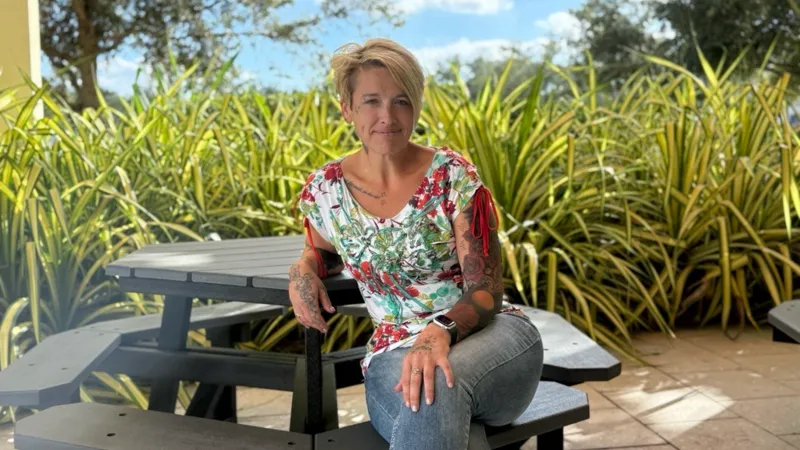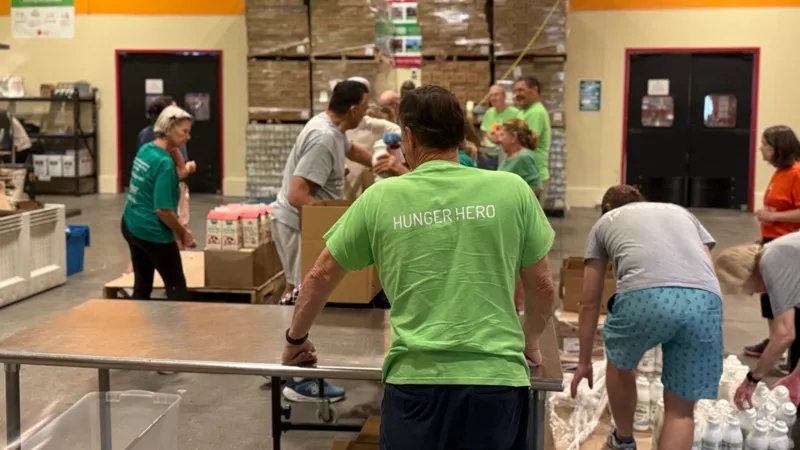Chantille Manuel has spent the past five years transforming her life.
The Florida resident has celebrated five years in recovery for addiction, she has lost more than 140lbs (64kg), and has started her own businesses, a beauty salon.
Despite all these successes, Ms Manuel has struggled to put food on the table and depends on food assistance from local churches and the US government alike, to keep herself fed.

“I don’t want to have to have help from anybody, I want to be self-sufficient,” she says.
She is one of the more than 40 million Americans who may not get essential food assistance after Saturday, because of an ongoing government shutdown caused by the inability of Congress to agree a new funding deal- a growing part of the US food aid crisis.
The Supplemental Nutrition Assistance Program (Snap) is used by one in eight Americans – including Ms Manuel – and plays a vital role in how many people purchase their groceries. It works by giving people reloadable debit cards that they can use to buy food.
But officials who oversee the programme say they will not have the funds to pay full benefits from 1 November.
Ms Manuel spent the last of her October Snap money last week on essentials like coffee, creamer, and tuna.
She could not pause to consider whether or not the government would find a solution before Saturday when she made her purchases.
“It’s either going to be there or it’s not,” she says. “So I might as well get what I need right now.”
Earlier this month, the Trump administration declined to draw on a contingency fund that would have continued benefits, saying this was needed for potential emergencies such as natural disasters.
At any rate, even those contingency funds would not have been enough to fully resolve the issue. They would only cover about 60% of a single month of benefits payments, according to the Center on Budget and Policy Priorities (CBPP), a think-tank focused on policies that help low-income families.
Democrats and Republicans have disagreed over using the contingency funding to at least ease the situation.
Democrats have argued that the Trump administration has already secured funding for other essential services during the shutdown – such as keeping up payments to members of the military – so could do the same with Snap.
Trump’s Republicans, meanwhile, say that Snap will receive its funding once again if Democrats reopened the government – seeking to blame the opposition party for an impasse which is now in its fifth week.
On Tuesday, Democrats in the US Senate introduced legislation to continue to fund Snap during the shutdown. It remains unclear if that has enough votes to pass.
While lawmakers in Washington continue to play the blame game, the “fundamental safety net” of Snap hangs in the balance, says Hanna Garth, a Princeton University professor who studies food insecurity.
“Many users make very little money, even though they work,“ she says. “And so it becomes this critical lifeline that keeps families out of deep, deep poverty. It can also be the tipping point that moves some families above the poverty line.”
Because these funds might not be replenished from Saturday onwards, many Americans will have to turn to other places to get food – like food banks.
Food bank warns of ‘new storm’

On a sunny Tuesday, a dozen or so volunteers fill a warehouse packaging space inside the All Faiths Food Bank in Sarasota, Florida.
They fed more than 80,000 people with more than 22 million pounds of food last year, and the need in the area continues to grow, says Nelle Miller, the food bank’s CEO.
Since the current government shutdown began, the food bank has seen an increase in people needing food.
“We had three hurricanes here last year. It was a disaster, but this is a new storm,” she says. “The difference is that people will not immediately recover.”
Roughly 20,000 people in the area use Snap benefits, she says – and of those people, roughly 6,000 also use the food bank’s resources.
Ms Miller is worried about what happens to those 14,000 Snap recipients after their payouts dry up this weekend. Will they need the food bank’s help as well, she asks.
While All Faiths is able to redistribute its food supplies in order to feed more people in case of need, that would mean each person getting less food, she explains.
“Receiving food is an inalienable right. You’re born on Earth, there’s enough food here to feed everyone. It’s a distribution problem,” Ms Miller says.
“I just can’t imagine denying food, water, or air to any human being. This is really difficult, it’s very distressing.”
A family of four on average receives $715 (£540) per month, according to CBPP, which breaks down to a little less than $6 per person per day.
But as an individual, Austin Lemmer receives even less than that – $295 each month.
He has already spent his October Snap benefits and is readying himself to not receive next month’s.
“I’m super anxious,” he says. “I’ve been trying to stretch the little bit of food that I have as far as possible, but there’s only so much you can do, especially when you’re already living on bags of rice and canned beans.”
Individual states administer the programmes, with much of the funding coming from the federal government.
Several states have pledged to use their own funds to cover any shortfall, however the federal government has warned that they will not be reimbursed.
Some states – including Florida – have said their Snap recipients will lose benefits if nothing is done before the weekend.
In an effort to stop that, on Tuesday, 25 Democrat attorneys general in 25 states plus the District of Columbia sued the Trump administration over its plan to halt funding for food aid.
They argued that a decision by the administration to not use the contingency funds would be unlawful and deprive millions of Americans from being able to afford groceries — worsening the US food aid crisis.
Responding to the lawsuit, the US Department of Agriculture blamed Democrats for the fund running dry, and said the party needed to decide whether it wanted to “hold out for the Far-Left wing of the party or reopen the government so mothers, babies, and the most vulnerable among us can receive timely WIC and SNAP allotments”.
The government shutdown entered its 29th day on Wednesday, and is the second-longest shutdown in history.
There has been no meaningful progress towards a deal to reopen the government.
That is something that has frustrated many Snap recipients, like Ms Manuel.
“I don’t feel like [the politicians in Washington] would make the decision that they’re making if it affected them, the way it affects us,” she says.
“As long as they’re eating, that’s what they care about.”
Source: BBC
Also read: US government shutdown continues with no end in sight
For more videos and updates, check out our YouTube channel


